Reports of escalating violence against foreign nationals living in South Africa have again come to the fore.
However non-South Africans face a more insidious form of prejudice inherent in the system on a day-to-day basis. Has xenophobia become institutionalised? We look at various areas where foreigners are systemically disadvantaged.
The lucky 13 digits

South African ID book (Photo: Waldo Schafli, M&G) Try opening a store account, obtaining credit bureau reports or using certain websites without a South African Identity Document. You’re not likely to get very far.
“You have institutions like banks and to some extent hospitals that are just insensitive to the variety of people likely to be their clients,” Tara Polzer, senior researcher at Wits University’s Forced Migration Studies Programme told the Mail & Guardian.
Either policy or computer systems dictate that certain institutions can only accept 13 number digits –excluding foreign nationals without an ID.
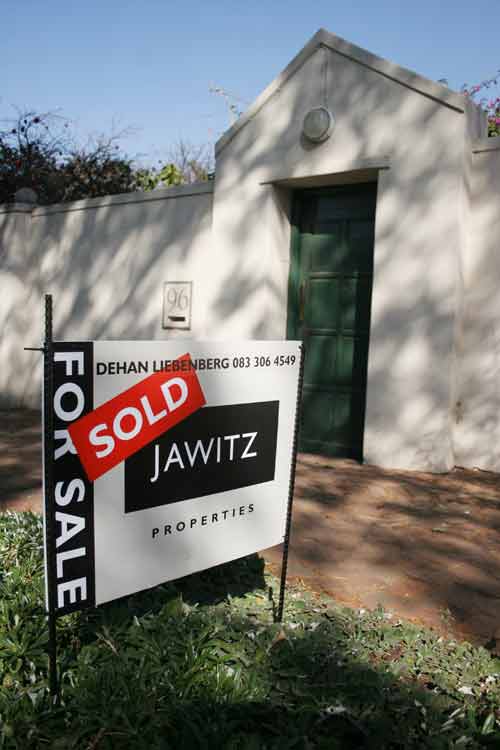
House for sale (Photo: Oupa Nkosi, M&G)
Home loans
Peter* is a qualified chartered accountant from Zimbabwe who has worked in South Africa for the past three years.
He is currently employed by the government of South Africa as a senior manager and said it was a nightmare to get a mortgage loan with a civil servant’s pay slip.
“When I finally got it, I am inherently classified as a higher risk profile — hence I pay more interest than a South African with the same credit record as mine and the same job and risk profile.”

Buying a car (Photo: Oupa Nkosi, M&G)
Car Loans
As a Zimbabwean he hasn’t had much more luck with car financing either. Peter said he and his wife have been trying to get a car loan for the past three years and not succeeded — despite their perfect credit records.
“All the big four banks have told us to bring a South African driver’s licence. We both have international driver’s licences which are accepted by all insurance companies — what a contradiction.”
He tried converting to a South African licence but the traffic department only makes the service available to permanent residents — not those with work permits.
Given that one can ordinarily only apply for a permanent residence permit after six years of living in South Africa, a foreigner can effectively only get a car loan after six years of staying in the country.
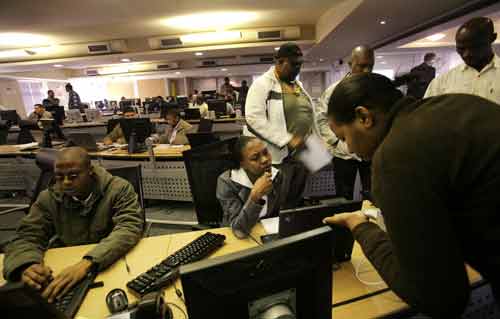
Web system design (Photo: Lisa Skinner, M&G) Internet services
Almost all internet-linked services in South Africa require an ID.
“My wife could not apply for an overdraft facility over the internet because she had to put in a South African ID number, so she had to visit the branch personally,” said Peter.
Even Primedia’s Eyewitness news sms breaking alert required a South African ID number.
The one exception was a bitter one — the South African Revenue Service allows tax returns to be submitted electronically without a South African ID.

Cellphone contracts (Photo: Oupa Nkosi, M&G) Cellphone contracts and work permits
While foreign nationals are allowed to take out a cellphone contract, those whom the M&G spoke to said it was often quite difficult, as one had to convince those helping at the store that this was actually possible.
Business Day Journalist, Wilson Johwa, had to resort to getting a cellphone contract in his girlfriend’s name.
South African work permit
He said the main challenge that arose when making the transition from his home country to South Africa was navigating the bureaucracy and getting a work permit.
“The difficulty with the work permit was with collecting the documents.”
Apart from his passport, he needed:
- The advert he responded to
- A letter from his employer motivating why he was chosen
- A list of the names of the people who applied for the same position and didn’t make it
- A security clearance from his home country and other countries he had lived in the previous five years
Johwa said this often proves difficult as it requires an employer who is cooperative and willing to do those things on behalf of a foreigner.
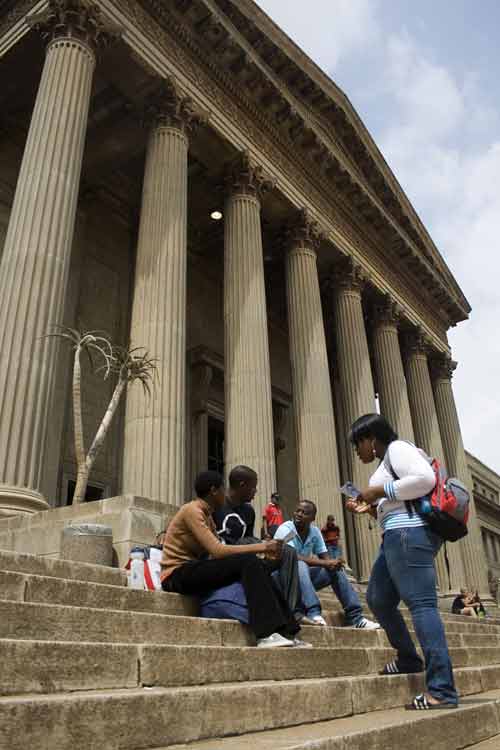
University students (Photo: Delwyn Versamy, M&G) International students
Marcel*, an international BSC student at Wits University said the greatest challenge facing foreign students was having to pay for a full years tuition upfront at the beginning of the year.
As a student from the Southern African Development Community (Sadc) he said he was required to pay a smaller fee in comparison to other students who are not from the Sadc region.
If a Kenyan student for example wanted to study medicine at Wits they would be required to pay R138 000 — and the amount goes up every year.
“If you are a son of an average man in South Africa and you have to pay R40 000 upfront, it’s quite a lot. This is even worse if you come from a middle-class family from another African country because the Rand is relatively strong.”
Finding accommodation like a flat, he said, was another difficulty.
“You have to produce documents to show how much revenue you earn but because I am on a student permit I have to use documents that belong to someone else who lives here and has a job.”
Michael Barre, an international student from Gabon, said he had often found himself in a similar predicament.
“I’ve been looking for a job since December last year, but every time I have interviews with an employer, they ask me if I have a work permit. When I ask the employer for the letter that will allow me to get a work permit they refuse.”
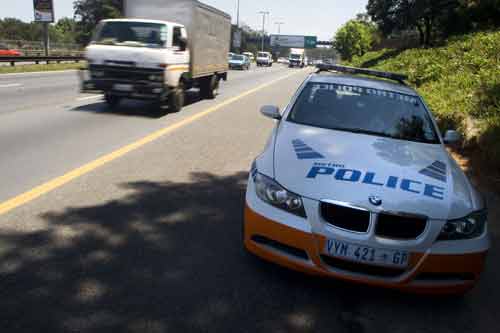
JMPD on high alert (Photo:Delwyn Versamy, M&G)
Foreign national drivers
According to the South African Services website a foreign driver’s licence or international driver’s permit can only exchanged for a South African licence if the applicant is a permanent resident.
Barre said he carried a large file of documents when driving in South Africa to ward off the constant hassles from traffic cops.
To get into the traffic system as a foreign national, he said he needed to present his drivers licence, obtained from his home country, a traffic register number his passport and a study permit.
When he gets pulled over by traffic cops he now also presents a letter from his embassy proving that his Gabonese driver’s licence is valid.
“I always showed my traffic register number and my driver’s licence only but there was this traffic guy who complained that I needed a letter from the embassy, so I carry that too.”
Berre said he was not sure if that was required by South African law or whether the traffic officer he met on that particular day wanted a bribe.
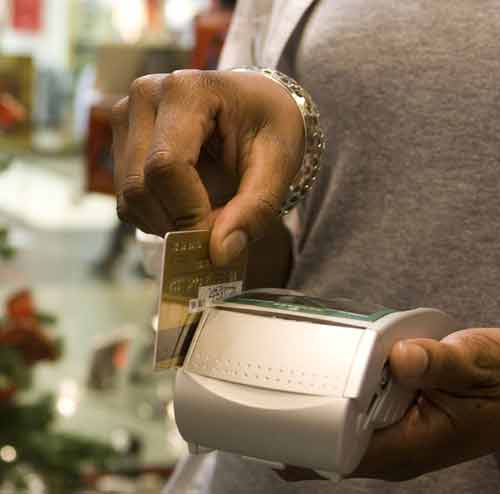
Credit (Photo: Oupa Nkosi, M&G)
Opening Bank Accounts
Non-South Africans the M&G spoke to complained that some banks did not want to open bank accounts for them because they did not have an ID.
While South Africa’s big four banks open bank accounts for foreign nationals others, like Capitec Bank, insisted on a South African ID.
Jennifer*, who is also from Zimbabwe, works as an analyst in a South African bank, and has been in the country for six years.
In May she was told by Capitec Bank, of an advisory issued to them by the Financial Intelligence Centre (FIC) stating that foreigners could only open bank accounts if they had permanent residency, with the only exception being mineworkers.
According to Capitec, as they are not an authorised dealer in foreign exchange, they are not permitted to open bank accounts for non-residents.
The ban extends to foreign nationals with a valid passport and temporary residence permit or temporary work or quota permit.
Jennifer said these tight and confusing credit policies had forced her to invest overseas.
“I am now investing in property overseas simply because the banks here will only fund me with a 50% deposit, despite a six year flawless credit history, and an overseas bank will fund me with a smaller deposit.”
She said these polices put in place by companies and legislators needed to be rethought.
“[They] need to think out of the box and develop policies that allow people that work here to spend and invest in South Africa. A South African ID shouldn’t be the be-all and end-all of everything”.